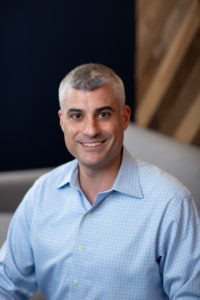Evident (also known as Evident ID), is a four-year-old InsurTech startup generating some added momentum since the COVID-19 pandemic struck in March, making nearly every meeting, business transaction and work experience a work-from-home endeavor.

“The pandemic is dramatically impacting our relevance here,” company founder and CEO David Thomas.
Evident’s technology allows for the safe and private sharing of data between individuals and businesses, focused on verification of identity and credentials. Among its many services: Working with global insurers to make sure individual and business policies are active, valid and meet regulatory requirements.
Beyond insurers, its target market sectors also include healthcare and financial services.
Thomas himself comes from the cybersecurity space, with previous executive roles at companies including Motorola, AirDefense, VeriSign and SecureIT. He’s also a U.S. Department of Defense veteran.
Below, he answers a series of questions submitted via email by Carrier Management Editor Mark Hollmer
Q: Can you tell me about Evident ID and a little bit of its origins?
Thomas: Evident has created an “Identity Assurance Platform.” It lets businesses confidently confirm the identity of individuals and businesses and then securely exchange data with them. We were founded in 2016 and we’re based in Atlanta, GA and Krakow, Poland. We employ more than 70 people globally. We have raised over $28 million in capital.
Q: At what development stage is your technology?
Thomas: We’re in growth stage, and have been serving major customers at high volumes since 2017. We were really fortunate that our very first customer was Airbnb, and they’ve since stretched our capabilities into 150+ markets. We can verify insurance globally.
Q: Where do you fit in the InsurTech space?
Thomas: Our clients have always used our services to reduce risk. We arm our customers with clear evidence that their network of suppliers or partners meets key requirements to provide safe, quality service. And the more our clients can demonstrate that they are controlling their risk, the more relevant our compliance reports become to their insurers.
Q: Why should P/C insurers care about your company?
Thomas: Generally, we help their clients control for risk and business continuity, and insurers are looking for us to help clients maintain compliance, but also prove that compliance is actually happening.
Q: Tell me about your COVID app – what does it do and what was the genesis of its development?
Thomas: Like most CEOs, when the pandemic hit, I started looking at what it would take to get our people back in the office. We quickly realized that companies would need to be able to assess health status for remote employees, support contact tracing efforts and have a way to manage and analyze this data to make business decisions. And, of course, this would all need to be done with security and privacy locked down. Turns out, we were in the perfect position to create such a tool. So we did!
Q: How the coronavirus pandemic affected your company’s development?
Thomas: The pandemic is dramatically impacting our relevance here. Our COVID Health status app is being used by customers to collect and track their employee’s health condition. Whether it is people taking steps to keep employees safe or properly documenting on the job infections, insurers are uniquely keying into the protocols being followed. Also, a byproduct of the current climate is a disrupted supply chain – our clients turn to us to help verify the credentials and insurance of their vendors and need us to support business continuity and to mitigate the risk their vendors expose them to.
Q: Other startups are focused on making their technology more pandemic friendly. How do you stand out from them?
Thomas: I think we already had many qualities that made us valuable in a pandemic – support for remote interactions and the secure exchange of data. We’re just doubling down.
Q: What is your long-term strategy? How big do you hope to be in five years?
Thomas: We are a young startup with big aspirations, and we are looking at a market that has very little data on risk. So we see the opportunity as very significant. We don’t focus on how large we’ll be in 5 years, but we often think about the type of impact we would like to have in the longer term. We can enable information about risk to flow securely and effortlessly between businesses and individuals, and that’s applicable in virtually every business.
Q: Are you raising a new financing round?
Thomas: We aren’t raising money. We are always looking to meet smart people that can offer us new insights on the space.





















 Berkshire-owned Utility Urges Oregon Appeals Court to Limit Wildfire Damages
Berkshire-owned Utility Urges Oregon Appeals Court to Limit Wildfire Damages  Nearly 26.2M Workers Are Expected to Miss Work on Super Bowl Monday
Nearly 26.2M Workers Are Expected to Miss Work on Super Bowl Monday  Winter Storm Fern to Cost $4B to $6.7B in Insured Losses: KCC, Verisk
Winter Storm Fern to Cost $4B to $6.7B in Insured Losses: KCC, Verisk  Flood Risk Misconceptions Drive Underinsurance: Chubb
Flood Risk Misconceptions Drive Underinsurance: Chubb 





